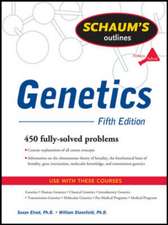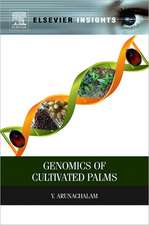Bioinformatics: Volume II: Structure, Function and Applications: Methods in Molecular Biology, cartea 453
Editat de Jonathan M. Keithen Limba Engleză Hardback – 22 mai 2008
| Toate formatele și edițiile | Preț | Express |
|---|---|---|
| Paperback (4) | 604.86 lei 6-8 săpt. | |
| Springer – 21 iun 2018 | 604.86 lei 6-8 săpt. | |
| Humana Press Inc. – 26 mai 2011 | 606.08 lei 38-44 zile | |
| Humana Press Inc. – 26 mai 2011 | 681.19 lei 38-44 zile | |
| Springer – 6 iul 2018 | 709.11 lei 6-8 săpt. | |
| Hardback (4) | 827.24 lei 38-44 zile | |
| Humana Press Inc. – 22 mai 2008 | 827.24 lei 38-44 zile | |
| Springer – 29 noi 2016 | 840.48 lei 6-8 săpt. | |
| Humana Press Inc. – 22 mai 2008 | 909.05 lei 38-44 zile | |
| Springer – 29 noi 2016 | 950.36 lei 6-8 săpt. |
Din seria Methods in Molecular Biology
- 9%
 Preț: 791.59 lei
Preț: 791.59 lei - 23%
 Preț: 598.56 lei
Preț: 598.56 lei - 20%
 Preț: 882.95 lei
Preț: 882.95 lei -
 Preț: 252.04 lei
Preț: 252.04 lei - 5%
 Preț: 802.69 lei
Preț: 802.69 lei - 5%
 Preț: 729.61 lei
Preț: 729.61 lei - 5%
 Preț: 731.43 lei
Preț: 731.43 lei - 5%
 Preț: 741.30 lei
Preț: 741.30 lei - 5%
 Preț: 747.16 lei
Preț: 747.16 lei - 15%
 Preț: 663.45 lei
Preț: 663.45 lei - 18%
 Preț: 1025.34 lei
Preț: 1025.34 lei - 5%
 Preț: 734.57 lei
Preț: 734.57 lei - 18%
 Preț: 914.20 lei
Preț: 914.20 lei - 15%
 Preț: 664.61 lei
Preț: 664.61 lei - 15%
 Preț: 654.12 lei
Preț: 654.12 lei - 18%
 Preț: 1414.74 lei
Preț: 1414.74 lei - 5%
 Preț: 742.60 lei
Preț: 742.60 lei - 20%
 Preț: 821.63 lei
Preț: 821.63 lei - 18%
 Preț: 972.30 lei
Preț: 972.30 lei - 15%
 Preț: 660.49 lei
Preț: 660.49 lei - 5%
 Preț: 738.41 lei
Preț: 738.41 lei - 18%
 Preț: 984.92 lei
Preț: 984.92 lei - 5%
 Preț: 733.29 lei
Preț: 733.29 lei -
 Preț: 392.58 lei
Preț: 392.58 lei - 5%
 Preț: 746.26 lei
Preț: 746.26 lei - 18%
 Preț: 962.66 lei
Preț: 962.66 lei - 23%
 Preț: 860.21 lei
Preț: 860.21 lei - 15%
 Preț: 652.64 lei
Preț: 652.64 lei - 5%
 Preț: 1055.50 lei
Preț: 1055.50 lei - 23%
 Preț: 883.85 lei
Preț: 883.85 lei - 19%
 Preț: 491.88 lei
Preț: 491.88 lei - 5%
 Preț: 1038.84 lei
Preț: 1038.84 lei - 5%
 Preț: 524.15 lei
Preț: 524.15 lei - 18%
 Preț: 2122.34 lei
Preț: 2122.34 lei - 5%
 Preț: 1299.23 lei
Preț: 1299.23 lei - 5%
 Preț: 1339.10 lei
Preț: 1339.10 lei - 18%
 Preț: 1390.26 lei
Preț: 1390.26 lei - 18%
 Preț: 1395.63 lei
Preț: 1395.63 lei - 18%
 Preț: 1129.65 lei
Preț: 1129.65 lei - 18%
 Preț: 1408.26 lei
Preț: 1408.26 lei - 18%
 Preț: 1124.92 lei
Preț: 1124.92 lei - 18%
 Preț: 966.27 lei
Preț: 966.27 lei - 5%
 Preț: 1299.99 lei
Preț: 1299.99 lei - 5%
 Preț: 1108.51 lei
Preț: 1108.51 lei - 5%
 Preț: 983.72 lei
Preț: 983.72 lei - 5%
 Preț: 728.16 lei
Preț: 728.16 lei - 18%
 Preț: 1118.62 lei
Preț: 1118.62 lei - 18%
 Preț: 955.25 lei
Preț: 955.25 lei - 5%
 Preț: 1035.60 lei
Preț: 1035.60 lei - 18%
 Preț: 1400.35 lei
Preț: 1400.35 lei
Preț: 827.24 lei
Preț vechi: 1074.34 lei
-23% Nou
Puncte Express: 1241
Preț estimativ în valută:
158.31€ • 164.34$ • 132.01£
158.31€ • 164.34$ • 132.01£
Carte tipărită la comandă
Livrare economică 18-24 martie
Preluare comenzi: 021 569.72.76
Specificații
ISBN-13: 9781603274289
ISBN-10: 1603274286
Pagini: 520
Ilustrații: XIV, 506 p. 120 illus., 3 illus. in color.
Dimensiuni: 189 x 246 x 37 mm
Greutate: 1.29 kg
Ediția:2008
Editura: Humana Press Inc.
Colecția Humana
Seria Methods in Molecular Biology
Locul publicării:Totowa, NJ, United States
ISBN-10: 1603274286
Pagini: 520
Ilustrații: XIV, 506 p. 120 illus., 3 illus. in color.
Dimensiuni: 189 x 246 x 37 mm
Greutate: 1.29 kg
Ediția:2008
Editura: Humana Press Inc.
Colecția Humana
Seria Methods in Molecular Biology
Locul publicării:Totowa, NJ, United States
Public țintă
ResearchCuprins
Structures.- UNAFold.- Protein Structure Prediction.- An Introduction to Protein Contact Prediction.- Analysis of Mass Spectrometry Data in Proteomics.- The Classification of Protein Domains.- Inferring Function.- Inferring Function from Homology.- The Rosetta Stone Method.- Inferring Functional Relationships from Conservation of Gene Order.- Phylogenetic Profiling.- Phylogenetic Shadowing.- Prediction of Regulatory Elements.- Expression and Microarrays.- Identifying Components of Complexes.- Integrating Functional Genomics Data.- Applications and Disease.- Computational Diagnostics with Gene Expression Profiles.- Analysis of Quantitative Trait Loci.- Molecular Similarity Concepts and Search Calculations.- Optimization of the MAD Algorithm for Virtual Screening.- Combinatorial Optimization Models for Finding Genetic Signatures from Gene Expression Datasets.- Genetic Signatures for a Rodent Model of Parkinson's Disease Using Combinatorial Optimization Methods.- Analytical and Computational Methods.- Developing Fixed-Parameter Algorithms to Solve Combinatorially Explosive Biological Problems.- Clustering.- Visualization.- Constructing Computational Pipelines.- Text Mining.
Recenzii
From the reviews:
"In general, this book describes some of the most useful and widely used techniques in the field of bioinformatics. … it covers a wide variety of topics to satisfy the large audience involved in using and developing bioinformatics. … These will be of extreme importance to those involved in utilization and development of bioinformatics methods. The book is written for students and beginning level bioinformatics researchers. … This is a good reference in the field of bioinformatics, particularly for those who are just starting out." (Basabi Rana, Doody’s Review Service, September, 2008)
"Bioinformatics is presented … with a total of 51 chapters. … successfully cover the wide field of bioinformatics, providing many useful methods, the majority of which are accessible to the non-specialist. … will serve as a valuable reference and therefore may be most appropriate as an institutional purchase." (Conrad Nieduszynski, Microbiology Today, February, 2009)
"Volume II contains 25 chapters that cover computational approaches and theory in analyzing function and structure of protein and nucleic acid sequences. … give relatively in-depth coverage of many concepts that are applied by bioinformatics specialists. … Many of the chapters are example driven, with basic forays into bioinformatics analyses that will educate readers in both the theory and practical matter of running the analyses." (Jason E. Stajich, The Quarterly Review of Biology, Vol. 84, September, 2009)
"This volume emphasizes protein analysis and function recognition. … In summary, this book presents a number of bioinformatics tools and methods, ranging from protein structure prediction, to gene function inference, to microarray data profiling. … The book is very suitable for entry-level bioinformaticians and clinical researchers." (Hsun-Hsien Chang, ACM Computing Reviews, August, 2009)
"In general, this book describes some of the most useful and widely used techniques in the field of bioinformatics. … it covers a wide variety of topics to satisfy the large audience involved in using and developing bioinformatics. … These will be of extreme importance to those involved in utilization and development of bioinformatics methods. The book is written for students and beginning level bioinformatics researchers. … This is a good reference in the field of bioinformatics, particularly for those who are just starting out." (Basabi Rana, Doody’s Review Service, September, 2008)
"Bioinformatics is presented … with a total of 51 chapters. … successfully cover the wide field of bioinformatics, providing many useful methods, the majority of which are accessible to the non-specialist. … will serve as a valuable reference and therefore may be most appropriate as an institutional purchase." (Conrad Nieduszynski, Microbiology Today, February, 2009)
"Volume II contains 25 chapters that cover computational approaches and theory in analyzing function and structure of protein and nucleic acid sequences. … give relatively in-depth coverage of many concepts that are applied by bioinformatics specialists. … Many of the chapters are example driven, with basic forays into bioinformatics analyses that will educate readers in both the theory and practical matter of running the analyses." (Jason E. Stajich, The Quarterly Review of Biology, Vol. 84, September, 2009)
"This volume emphasizes protein analysis and function recognition. … In summary, this book presents a number of bioinformatics tools and methods, ranging from protein structure prediction, to gene function inference, to microarray data profiling. … The book is very suitable for entry-level bioinformaticians and clinical researchers." (Hsun-Hsien Chang, ACM Computing Reviews, August, 2009)
Textul de pe ultima copertă
Not only is the quantity of life science data expanding, but new types of biological data continue to be introduced as a result of technological development and a growing understanding of biological systems. Methods for analyzing these data are an increasingly important component of modern biological research. In Bioinformatics, leading researchers in the field provide a selection of the most useful and widely applicable methods, able to be applied as is, or with minor variations, to many specific problems. Volume II: Structure, Function and Applications contains methods pertinent to the prediction of protein and RNA structures and the analysis and classification of structures, methods for inferring the function of previously identified genomic elements, chiefly protein-coding genes, medical applications in diagnostics and drug discovery, and "meta-methods" for developers of bioinformatics algorithms. As a volume of the highly successful Methods in Molecular Biology™ series, this work provides the kind of detailed description and implementation advice that is crucial for getting optimal results.
Comprehensive and cutting-edge, Bioinformatics: Volume II: Structure, Function and Applications is an ideal reference for all scientists involved with the ever-growing array of data in the expanding field of life science.
Comprehensive and cutting-edge, Bioinformatics: Volume II: Structure, Function and Applications is an ideal reference for all scientists involved with the ever-growing array of data in the expanding field of life science.
Caracteristici
Encompasses topics from across the diverse field of bioinformatics through its broad scope approach Over 80 authors from around the globe contribute to the two volumes, including many leading experts in their respective subjects An inter-disciplinary collaboration involving biologists, biochemists, physicists, mathematicians, statisticians and computer scientists Contains simplified descriptions, requiring a minimum of background knowledge, amenable to students and beginners in bioinformatics References a wide variety of software tools and scripts, available online Includes supplementary material: sn.pub/extras







